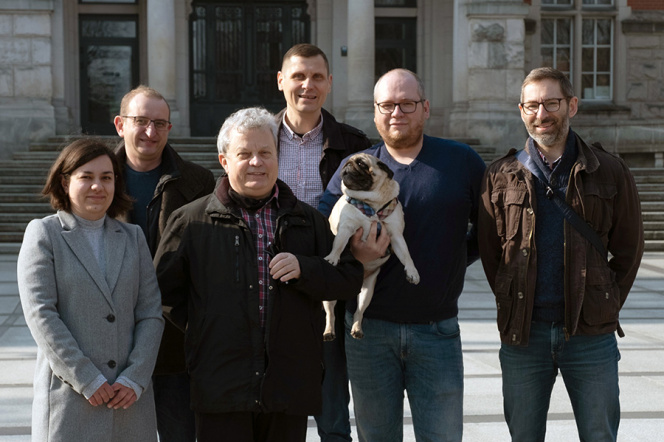Date added: 2021-04-16
How to verify that your dog is not human? Scientists from Gdańsk are working on it

Currently used methods that allow to determine the concentration of the human genome usually require duplication of DNA material (e.g. in the polymerase chain reaction - PCR), which makes them complicated and time-consuming, and the result often depends on human error - emphasize Gdańsk scientists in the article entitled ‘Multisine impedimetric probing of biocatalytic reactions for label-free detection of DEFB1 gene: How to verify that your dog is not human?’ on the pages of Sensors & Actuators: B. Chemical (IF = 7.1).
– In our solution, we use electrochemical biosensors consisting of boron-doped and properly functionalized diamond electrodes, where the detection is based on the measurement of changes in the kinetics of the electrode process due to the ongoing DNA hybridization - says PhD, Eng. Jacek Ryl, Gdańsk Tech professor from the Faculty of Applied Physics and Mathematics and Albert’s master.
The use of diamond electrodes is to allow the creation of electrochemical platforms with a very high level of sensitivity, thanks to which it is possible to significantly increase not only the range of the researched analytes, but also to raise their detection limit. Such electrodes are also characterized by high chemical resistance and are biocompatible.
– As far as we know, when trying to determine DNA, we performed a qualitative electrochemical analysis of a complex of macromolecular structures based on the monitoring of temporary changes in impedance of the tested system for the first time - says PhD Paweł Niedziałkowski from the Faculty of Chemistry, University of Gdańsk.
The aim of the research was the beta-defensin 1 gene (DEFB1), which encodes an antimicrobial peptide related to the resistance of the epithelial surface to microbial colonization. It is a gene that is present in the human genome and is specific only to human DNA, so it can be used to distinguish between human DNA and DNA from other organisms.
The innovative approach to the detection of human DNA proposed by scientists from Gdańsk may turn out to be useful in medical diagnostics or forensics when analyzing DNA samples of unknown origin (currently, human body fluid antibody tests are used or PCR tests are performed to detect human DNA).
Members of the research team: PhD Paweł Niedziałkowski (Faculty of Chemistry, University of Gdańsk), PhD, DSc, Eng. Jacek Ryl, university professor (Faculty of Applied Physics and Mathematics, Gdańsk Tech), PhD, Eng. Joanna Wysocka (at the time of writing the article, Faculty of Chemistry, Gdańsk Tech, currently Institute of Biotechnology and Molecular Medicine), prof. PhD, DSc, Eng. Tadeusz Ossowski (Faculty of Chemistry, University of Gdańsk), PhD, DSc, Eng. Paweł Ślepski, university professor (Faculty of Chemistry, Gdańsk Tech), PhD, DSc, Eng. Robert Bogdanowicz, university professor (Faculty of Electronics, Telecommunications and Informatics at Gdańsk Tech), PhD, Eng., Michał Sobaszek (FETI, Gdańsk Tech), PhD Joanna Charmier-Ciemińska (Laboratory of Forensic Biology and Genetics, GUMed), PhD Łukasz Burczyk (Faculty of Chemistry, Gdańsk Tech), PhD Anna Wcisło (Faculty of Chemistry, University of Gdańsk).

